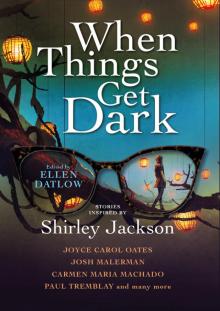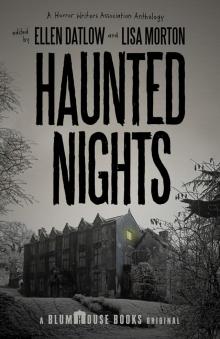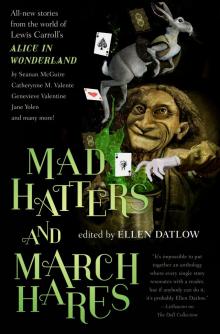- Home
- Ellen Datlow
The Dark Page 4
The Dark Read online
Page 4
Apparently my aunt had faith I could cook. But she also perhaps knew how ineptly, or why hadn’t she wanted something more elaborate?
II
“THIS IS ALL a little cold, Laura. Did you heat everything thoroughly?”
I said nothing, refusing now to play her game.
Before she started her critique of the food (including its late arrival), she’d commented on the size of my meal—“Two sausages, Laura? And all those peas, surely a young woman needs to watch her figure … and I thought I had left a cabbage out. The frozen peas were for Sunday.”
Everything was fifth rate anyway. The sausages tasteless, the potatoes floury. Even the pie was flavored mostly with chemicals and had about three apple slices in it.
We ate in the dining room. This was another wide chamber, its windows giving on the lawn and the view of the sea. As daylight sank away, pink clouds and swallows came on, and then a high, blue-green dusk. By then I’d been back down for the appleless pie, and down again to make instant coffee. She didn’t ask me to do this, she told me. And I obeyed.
And I kept thinking, I can’t arrange a thing tonight. I’ll sort all this out in the morning.
Was I spineless? Less that than rather tired.
The instant coffee, too, was not the kind that makes people alert, sexy and wise in the adverts. It was the kind you use to scare out the drains.
After dinner she opened the French doors, however, and said we should have an after-dinner stroll on the lawn.
Was she showing me what I would be missing if I rebelled and ran away?
The sea lay far out, adrift in the sky, dark now, and darker than the luminous dusk, just as it had been more blue than the sky before. The air was fresh and pure and smelled of roses, clematis, and salt.
“Tomorrow,” said Aunt Jennifer, “perhaps you should make an early start. I’m afraid everything has got very dirty. Perhaps you should begin downstairs. You won’t forget to clean the windows, will you?”
I drew a breath of the beautiful air.
“Where in your letter to me,” I said, “exactly did you specify that if I came to stay in your house, I would automatically become your cook and cleaner?”
“Housekeeper, Laura.”
“I see. Did you mention a fee then, the wages I’d get for being your … er … housekeeper? I seem to have missed all that.”
“Oh, I can’t afford to pay you. I can’t afford that sort of luxury. But you’re getting your keep, aren’t you?”
I was, despite everything, dumbfounded by her relaxed demeanour. I thought, wildly, she’s been dreaming this up, perhaps for years. Why? To get at my mother? At me? What had I ever done to her?
We’d been walking along the lawn all this time, as if engrossed in the most ordinary, friendly dialogue.
Now, around the bushes, the drop opened before us, a sailing away of the hill in air and darkness, quite dramatic. And I thought, Shall I just push the old cow over? But naturally, I would never do that.
And then she said, “Did you see the clock in the corridor near your door?”
“What has—”
“Didn’t you think it rather peculiar?”
I said nothing, less from stern resolve than an inability to keep up with this.
“It has a story. That clock.”
She was, my aunt, a very dumpy, unattractive figure in her sensible jumper, skirt, and shoes. Yet in the last of the twilight, she was melting to a shadow of her former self, a dumpy, solid shadow, lit now and then by a smeary flash of eyes.
“This house was built about nineteen hundred, only about a hundred years ago. Some playwright owned it. Some homosexual creature. He used to collect eccentric bits of furniture. I’m sure I have no interest in him or in them, and none of them remain … apart from the clock. The clock was one of his finds, and it’s always been in the house. Quite a curiosity. One can’t move it, you see.”
Despite myself, I reacted. “Why not?”
“Because it was nailed to the floor of the upper story, and in such a way it would mean all the floor boards and the joists would have to come up, to pry it loose. I was warned about this. It’s an eyesore, of course,” she announced. “I don’t imagine even you, Laura, with your extreme notions, would like it. At one time the previous tenants had it boarded up—but all that gave way and … well, I couldn’t afford to have it done again.”
“And besides,” I added, “it’s only in the corridor that leads to the backstairs.”
“Yes, quite.”
Dark now. Night had come. The swallows were finished and instead, the odd bat was flitting over. I could just hear the sea, its slow sighing, so intimate, so eternally indifferent.
Jennifer said, “Did you see the two images painted on the face?”
“Yes.”
“Youth and Age, they’re called.”
An explanation disconcertingly formed in my mind. The mask was youth—rather a quaint idea, I supposed—a hollow false face that didn’t last and eventually had to come off to reveal what was truly there inside. Which was the evil-looking monkey? Yes, old age, the mischievous joker, it could make you ugly. Animal.
Was that precisely what was happening to Jennifer—mask ripped away, the mad beast beginning to show … ?
But she said, “All a lot of nonsense, of course. The interesting part is about the main body of the clock, the area inside the wooden frame.”
The day had been warm. It was getting chilly now. A stiff light wind, blowing in over cooling sea, iced down my arms and through my T-shirt, and between my sandaled toes crept the breaking dew.
“So?” I said. Why was I indulging her in this? What the hell was the matter with me? Tell her to fly off the hill, the old witch. Or I should. God, there must be a pub around here somewhere—light, warmth, sanity, and booze.
Jennifer said, “It’s haunted. The clock.”
She said it with enormous relish. As if she were counting it, like her money.
“Oh, I see.”
“It’s only a story, evidently,” she glibly said, facile in her absolute certainty that she was getting to me. Was she? I didn’t believe in—“I found the history in an old book once, a library book, or I could show you. An unpleasant little tale. Most unpleasant.”
“How do you know the clock in the book is the same clock?”
“Oh, the estate agent told me years ago, when I was buying the place. In case I found out, I imagine, and got ratty. Then when I read the story in the book, I recognized it was my clock, or rather the house clock. And the book gave a lot more details.”
“You’re obviously dying to tell me.”
I tried to sound patronizing, but really just wished I’d keep quiet.
She would tell me anyway.
But then Jennifer said, “Well, I don’t know, Laura. At this late hour. I remember what a nervous child you were—I don’t want to alarm you. It’s not a nice story. It might keep you awake. And you’ll need your sleep if you’re to get an early start on the house in the morning.”
And then—then—the foul old bag turned on her clumpy heel and marched away from me, up the lawn, toward her economically faint-lit house. Leaving me with only the cold night and the indifferent sea, and the uneasy suspicion that if I didn’t hurry after her, she might lock me out all night.
HAD I BEEN nervous as a child? Not especially. And yet there was a kind of something in me, always had been, a sort of feral awareness of … God knew what. Maybe that’s why, in part, I don’t believe in the supernatural. It’s less that I don’t than that I won’t.
My father had been sensitive. Not afraid or cowardly, I don’t mean that. But the rubbish of the world could get to him, truly upset him; reported cruelties in other countries, or my wretched mother … . It was why he’d died, I think. Worry, and trying not to worry, or rather never passing the worry on—to her, because he couldn’t; to me, because he wouldn’t.
I hated thinking of him like this, now sitting up in the awful bed, wonde
ring—I couldn’t help it—if Jennifer, his elder by three years, had tried to frighten him when he was a little boy. They’d both been kids when the war started and they were evacuated together to some farm. In my mind I had this picture of them in the unknown dark, he only about four or five, and she telling him horror stories.
All the time I sat there, I too was in the dark. There was no side-lamp, just the overhead bulb with the switch by the door. Another form of economy? Since, unless you wanted to sleep with the light full in your eyes, you had to turn it off before getting into bed.
Then the clock went off again. And I nearly jumped out of the house, let alone my skin.
This time, it clanged twice. But it was only just past midnight, according to my luminous alarm clock.
I thought (irrationally?), That’s the other reason she’s put me in here. So her damn clock can keep me awake.
Then, I heard the rustling sound.
Okay, I admit my hair stood on end. There I was in the spooky dark, alone, and here was this crepuscular little noise suddenly coming to join me, over there, by the door.
It’s mice, I decided.
So I switched on the torch I’d had the sense to bring, conjuring country lanes by night, and shone it full at the doorway, expecting to pick up two or more little bright mouse eyes.
It wasn’t mice.
There, pushed in under the door, were some sheets of paper.
I gaped at them. Then I got out of bed, crossed the intervening three feet of room, and picked the papers up. Then I switched on the overhead light.
The papers were handwritten, and I knew the writing, overornamented and tightly cramped, as if nothing must slip between the words or letters. It was hers. I’d seen it on her letter to me.
Disbelieving, despite the rest (and the obvious fact she must have crept soundless to my door in order to slot this under it), I read:
Laura, I remembered I had copied this from the library book I told you about. I thought you might be intrigued. I’ve pushed it under your door in order not to disturb you. Read it in the morning. No doubt, to your sophisticated mind, it will seem a very silly tale.
How was that for contradictory malice? Also, she knew I’d be “disturbed,” unless I was stone deaf and hadn’t heard the clangs of the clock.
I sat down on one of the bed’s rocky humps and read the remainder of the handwritten pages, which detailed carefully the story of the clock. They did read as if these passages had come from a book.
The clock, the text informed me, dated back to 1768, and had been made in France. In those days, it had had the normal glass window through which the pendulum might be seen, and the whole front of the lower clock might be opened in order to reach the workings. The face, then and now, was decorated with a macabre motif then current in decadent Paris, and entitled “Youth and Age,” represented in each respective case by a mask and a distorted, monkeylike human head.
During the French Revolution, the clock reached England, brought over, for some inane reason, by fleeing aristocrats. And in 1820, it passed into the possession of an English family named Trente. They placed it in their country house, somewhere in the vicinity of Lathamfold.
Due to various reverses, there came in time to be only two females left to represent the Trente family: a young woman, Sabia Trente, and her elderly aunt, Eugenia. Both had experienced rather irksome lives, the old aunt unmarried and impoverished, dependent on her young niece who, apparently no longer rich, and quite plain, was herself without hope of catching a suitable man.
The book, or Jennifer, omitted to say much about the existence they led together in their failing country mansion, rubbing each other up the wrong way all the while, since they didn’t like each other at all due to some quarrel in the family. Somewhat in the manner of an antique Cinderella, the aged aunt (she was sixty-odd, which must have been more like eighty in those days) was soon consigned to the servants’ quarters and required to carry out quite menial work uncomplimentary to her years and status. Sabia Trente, meanwhile, lost no opportunity to “heap contumely” on the old girl’s head, and in the end, they were deadly enemies.
By the year Sabia was thirty, youth’s bloom gone and her last illusory chance of marriage with it, they occupied the mansion with only one actual servant. The grounds had run to seed and weed. Local farmers grazed their pigs and sheep on the meadows, and paid the Trentes a pittance to do it. The house was in bad repair, some of its roof down, and all its treasures sold.
All, that is, but for the French clock.
It would seem there was some sentimental or superstitious reason why Sabia Trente had not sold the clock, which might have brought a fair price as a curiosity, having become, of its kind, quite rare.
However, rather than having been sold, something else happened with the clock.
One night, aunt and niece had a real falling-out. For years, they’d been arguing, but on this particular night it came to blows. Sabia struck first, slapping the old woman across the face and head so hard she fell down. It was then that Auntie Eugenia reached for a fire iron. She in turn struck her niece a blow “harsh enough it clove the brain-case in twain.”
Skull fracture accomplished, Auntie, in the rational panic of the amateur turned professional, dragged her niece to the tall clock, standing handy, undid the door, and with the super strength of fear and rage, stuffed Sabia inside. Then, Eugenia hauled the younger woman upright, propped her (presumably smashed head lolling and bleeding) against the pendulum—which naturally at once stopped moving—slammed shut the door and locked it. She then flung the key in the fire, where the heat soon deformed and disguised it. Last of all, the inventive homicide pulled down one of the frowsty curtains and slung it right over the clock, draping it from top to toe, and thus hiding its new grisly contents from view.
Jennifer’s library book calmly commented that the old servant woman, if she at all noticed the clock had been shrouded, paid no attention, being used to the “eccentricities of her mistresses.” And when the dead body began to stink? The clock apparently held most of that safely inside. The occasional whiff was put down to dead rats in the wall, an occurence of charming frequency.
Not even the disappearance of one of the Trentes was much noted. Both Sabia and Eugenia had long since ceased to frequent the village, or even the church. If the visiting pigs or farmers failed to see Sabia, trailing through the long grass of her estate in her ruined yellow gown, they doubtless only thought she had given up trailing, too, with her other renunciations.
As for the servant, “She asked no questions.”
Incredibly, if all this were a fact, Eugenia then lived on in the Trente house for five more years before she “died of an apoplexy.” The servant promptly left, stealing a few squalid items to assist her passage. Others came after the funeral, to clear and tidy the house. And that was when, of course, they found what was in the clock: a partly mummified, partly skeletal cadaver, held rigidly upright in its black-stained, pale yellow rags—which, once the curtain was fully off, was displayed as clearly as a mannequin in a shop window.
Some sort of investigation took place. It revealed, perhaps not amazingly, an account of what had actually happened, penned (boastfully?) by Aunt Eugenia in her journal and hidden in a concealed bureau drawer.
The clock meanwhile was broken open and the corpse removed and buried. A type of exorcism was reportedly performed. Exactly why was not specified. After that, the clock was sold at last, and went to unknown buyers.
Thereafter nothing was heard of it until early in 1909, when it reappeared at an auction, boarded all around with plain wood, and said very definitely to be haunted. This was when the gay playwright, who had formerly inhabited Jennifer’s house, saw the clock and collected it.
His name was Shelley Terrence, and he had enjoyed some stage successes during the Art Nouveau era, enough to set him up financially and leave him bored. At first he was “fascinated” by the clock, inviting his friends of all sexes down for weekends to se
e it. But then they, and he, changed their minds.
“Terrence alleged” said Jennifer’s book, “that several of his guests had been woken at night in terror, on more than one occasion, by ghastly moans and cries issuing from the sealed-up stem of the clock. One of the guests, a certain Lady Devere Payne, claimed to have witnessed a pallid figure, in a yellow gown of the early Victorian years, lurching through the bedroom, from wall to wall—through both of which walls she passed unhindered—and wearing besides a scarlet, fringed turban, which the lady subsequently realized was really a mass of wetly matted hair and blood.”
The guests fled, but worse was to follow.
Coming in late one evening, Terrence was standing talking with his manservant in the downstairs hall when both men heard a “creaking and groaning as of a ship at sea in high wind.” Looking up, each man saw the same thing—the clock, which seemed to be moving quite rapidly across the top of the main staircase. It disappeared before reaching the stairs’ opposite side, but not before they had also noticed shreds of yellowish material “billowing” from the spot where its door might have opened, had it still had one.
When they had gathered enough courage, Shelley and his man went to the room where the clock had originally been set down, and found it in a much altered position.
No surprise. Another exorcism followed. After which, it seemed, Terrence was advised against ousting the clock, and instead, recommended to have it ported to a back corridor and there nailed down with long iron farriers’ nails, right through the floorboards and a joist.
This did seem to end the clock’s personal activity. But by then, a name had been given the ghost: the Woman in Yellow. And she herself did not leave Shelley Terrence entirely alone.
She would manifest at random awful moments, such as when he stood shaving and abruptly saw her behind him in his mirror—a sight that so jolted him, he said, that he nearly cut off his ear. At last his nerves broke down, and he quit the house for America.

 Inferno
Inferno The Best of the Best Horror of the Year
The Best of the Best Horror of the Year When Things Get Dark
When Things Get Dark A Whisper of Blood
A Whisper of Blood Echoes
Echoes Blood Is Not Enough
Blood Is Not Enough Haunted Nights
Haunted Nights The Best Horror of the Year Volume Eleven
The Best Horror of the Year Volume Eleven The Green Man
The Green Man The Dark
The Dark Mad Hatters and March Hares
Mad Hatters and March Hares Nebula Awards Showcase 2009
Nebula Awards Showcase 2009 The Devil and the Deep
The Devil and the Deep